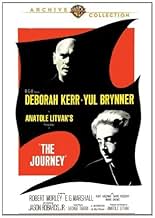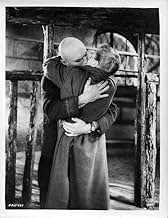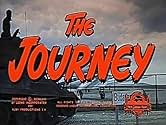Adicionar um enredo no seu idiomaA British woman trying to escape Hungary with her freedom fighter lover and a group of Westerners, as the Soviet Union moves to crush the Hungarian Revolution of 1956, finds herself the obse... Ler tudoA British woman trying to escape Hungary with her freedom fighter lover and a group of Westerners, as the Soviet Union moves to crush the Hungarian Revolution of 1956, finds herself the obsession of an enigmatic Communist officer.A British woman trying to escape Hungary with her freedom fighter lover and a group of Westerners, as the Soviet Union moves to crush the Hungarian Revolution of 1956, finds herself the obsession of an enigmatic Communist officer.
- Direção
- Roteiristas
- Artistas
- Prêmios
- 1 indicação no total
- Paul Kedes
- (as Jason Robards Jr.)
- Billy Rhinelander
- (as Ronny Howard)
- Françoise Hafouli
- (as Marie Daems)
- Borbala
- (as Barbara Von Nady)
- Von Rachlitz
- (as Siegfried Schurenberg)
- Direção
- Roteiristas
- Elenco e equipe completos
- Produção, bilheteria e muito mais no IMDbPro
Avaliações em destaque
Once the airport is closed, the titular journey begins on a bus taking them to Austria. As would be obvious, they are stopped on their way which is where they come up against the almost faultless Yul Brynner whose military power as a Red Army Major was marked with loneliness, his internal struggle between right and wrong, his search for the truth and his need to feel emotions for other human beings. He was saddened by the fact that his job had alienated him from his friends and enemies alike and he yearned for social contact.
Robert Morley plays the quintessential stiff upper-lipped Englishman who, no matter how serious the role, manages to maintain an almost light-hearted logical outlook on life while Jason Robards has a stunning movie debut which enforces the reason why he had so many roles throughout his career. Deborah Kerr, as the leading lady, exhibits the grace and femininity we have come to associate with her yet manages to bring over the strength and resolve required for her character.
The film deals with a very tempestuous time in European history but it never ceases to remind us that there is good in all of us and you can never completely judge a book by the cover. Fabulous scriptwriting ensures that for all the seriousness of the subject there can still be great one-liners and comedic instances that add to, rather than detract from the movie. The chemistry in the cat and mouse game between Kerr and Brynner makes you understand why they appeared in more than the one film together.
All in all, a thoroughly engrossing movie which I would definitely watch again. 8/10
The Journey is a film about a group of foreigners trapped within Hungary and seeking a way out. After being stuck in the Budapest Airport for a few days, the group is informed the Russians will provide transport to the Austrian border by bus. But one of the foreigners, a titled Englishwoman played by Deborah Kerr is traveling with Jason Robards, Jr., who is under an assumed name. Robards is Hungarian, a scientist and a supporter of the revolution.
They are stopped again near the border and detained in Kurt Kaszner's hotel while the Russians check on the passengers. Robards arouses Russian Major Yul Brynner's suspicions, but his hormones are aroused by Deborah Kerr.
Anatole Litvak who was Hungarian when he was handling the politics was on firm ground in The Journey. When he got into the romantic, sad to say he was hearkening back to his days in Hollywood when he directed a lot of romantic schmaltz. Try as I might I could not believe that Yul would be deterred in his duty, his character is a lot like Bounine the man he played in Anastasia, also directed by Litvak.
The characters of the passengers of the travelers is also interesting. Robert Morley was not playing for laughs as he does not do a John Bull type Englishman, but he's caring confidante for Kerr. I did like Anne Jackson, pregnant with two children traveling with her and her husband E.G. Marshall. Anne's character has a practical turn of mind and everyone should have been listening to her. Anouk Aimee is also good as a humorless and resolute Hungarian rebel.
And this review is dedicated to Veronica Laszlo wherever she is, the little girl who joined my third grade class way back in the day, when she fled Hungary. I hope she had a good life in America.
Equally fascinating and sexy, without removing her clothes, is Deborah Kerr. The script allows her to exude a sensuality that is not visual but suggestive--she reprised this sort of role years later in The Night of Iguana. The film does not suggest that she slept with anyone to help with the release of the group from the clutches of the Russians in fact she is shown as running away from the Russian Major (in contrast to the Maupassant story or the Isak Denisen story). Yet the film bursts with suggested but real physical allure of the Kerr character.
Kerr can never be classified as a beautiful actress in my view, but she is a superb actress. She puts her soul into dignifying the characters that she portrays, which often clashes with the spirit of the character. It is this contradiction that makes her roles in The journey, Quo Vadis, and The Night of Iguana memorable.
Why is this an unusual film? It is not easy in Hollywood to see Russian characters portrayed as good people--Dr Zhivago was an exception. Brynner's Romance of a Horse Thief was again great cinema by Abraham Polonsky but never acknowledged as such because of the intolerance towards Leftists in the post-McCarthy era.
The film is also unusual in its casting--great French actors Gerard Oury and Anouk Aimee--rub shoulders with Jason Robards Jr and British actor Robert Morley. In many ways the film is international than American. All four are great actors and add to the entertainment.
Those who have read Maupassant and Denisen's works will find the film is not true to either work. Yet the film can stand on its own as its sanitized (censored?) version has a dignified charm of its own--provided by the reality of the night that led to the release of the group. I think Litvak deserves to have the last laugh in providing an interesting and plausible twist to the tales that led to the making of the film, while entwining bits of both written tales (e.g. the last bus ride and the final kiss)
But I do have one grouse--why do Hollywood never acknowledge the sources that inspire the stories? Only recently (e.g., Insomnia) have the original works begun to be mentioned prominently in the credits.
The Journey, is so engaging, that I can watch it again and again. The Russian Folk Songs, Fantastic! and Yul singing!
The Gypsy music, the intrigue.
The shear magnetism of the Magnificent YUL who comes across with an array of emotions.Powerful, proud, vulnerable against the gracious, serene Deborah Kerr. This film is even on view on youtube, its that potent. I just wish some one could tell me the name of those Russian folk songs! Especially the drinking ones.And I wish there was a recording of Yul singing them..(but thats asking a bit too much isn't it!)
So I emailed TCM Turner Movies on tcmmailuk@turner.com and asked them why they hadnt released it on DVD, Im awaiting an answer. They are mad, because lots of us would love a copy for a present wouldn't we?
Cheers.
First, the actors use the actual languages of their roles. The Russian soldiers speak only Russian; the Hungarians only Hungarian; the Germans only German, except to the minimal extent to tell the story. Since Debra Kerr is English, she speaks only English, and, of course, Yul Brynner and a few others essential to the story also speak heavily accented English. As a result, the empathy of the audience to the travelers becomes paramount. The viewer shares all the confusion and suspense of being involved in an illicit border crossing when he/she cannot understand any of the languages spoken around them. Very powerful feelings are aroused in the audience, and notwithstanding the heavy use of foreign languages, the audience is never at a loss for following the film. No subtitles are necessary.
Second. I was in Hungary in 1995, and I'm telling you, this movie has it right on. From the gypsy music overpowering the dinner meal to the underground caverns in the buildings where much of the action takes place to the village scenes, the realism is incredible. If I didn't eat in the actual restaurant in the movie, I ate at its double. I thought that I actually walked down the main street in that village. (Actually, the film was shot in Austria).
Third, and most important, this movie reunites Deberah Kerr and Yul Brynner (after The King and I) and the magnetism between them as the story unfolds is nothing short of Oscar qualified. Of course, Yul already received an Oscar for playing that relationship, so the Acadamy wasn't going to give him another one, but that is the quality of the film. Don't miss this one.
Você sabia?
- CuriosidadesDuring filming, Yul Brynner's hand was cut by a former crazed lover who traveled across Europe to find him. There are scenes where Brynner's bandaged hand is not shown on-screen, and there are scenes where he is holding a prop to camouflage the hand.
- Erros de gravaçãoIn the final scene, as the camera dollies back from Major Surov's jeep, a camera/equipment shadow is visible on the jeep's right front tire.
- Citações
Diana Ashmore: [Dancing with the Major] You're drunk!
Major Surov: Yes, I am. And it's marvelous! Half my life I've been a soldier. Five campaigns, four scars, a shattered hip. And all that time, the Army's been my wife. A mean, old, possessive, insatiable, glorious bitch! And tonight I am cheating on her. And it's wonderful. Like picking flowers on a battlefield!
- ConexõesFeatured in Discovering Film: Yul Brynner (2015)
Principais escolhas
- How long is The Journey?Fornecido pela Alexa
Detalhes
Bilheteria
- Orçamento
- US$ 2.290.000 (estimativa)
- Tempo de duração2 horas 6 minutos
- Proporção
- 1.85 : 1
Contribua para esta página



































